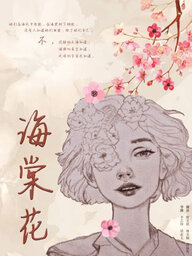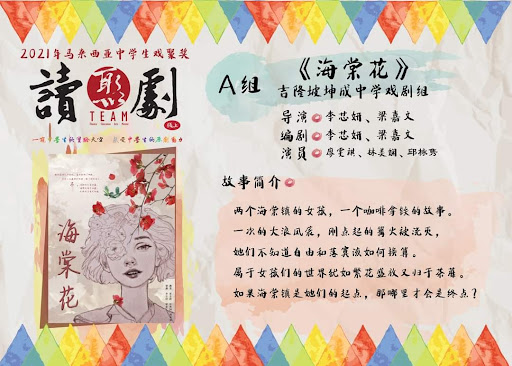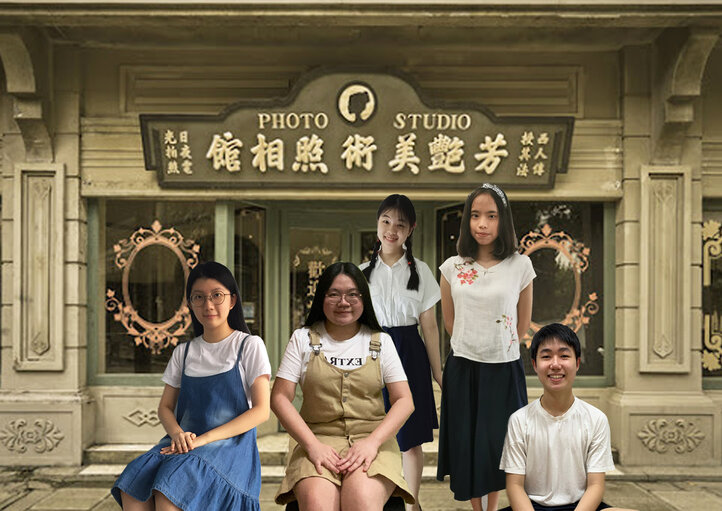Reported by:
Michael Ng Sr3A

Glory emanated from the 2021 Team Drama Awards as drama clubs and societies across the nation received commendation for their reader theatre productions showcased the week prior.
Of the nine categories of awards given out, the Kuen Cheng High School Drama Club snagged seven accolades with their drama “Asiatic Apple” (《海棠花》), a tragic tale about two lesbians whose romance is disrupted by internalised homophobia and social stigma. This makes them the club with the third most awards achieved, just behind Tsun Jin High School with 12 and Pin Hwa High School with 17.
We spoke with directors-screenwriters Lee Xin Yean and Leong Jia Wen to learn more about the backstory of their highly-commended drama.
“We want to thank the judging panel and Team Theatres for giving this bunch of theatre kids a space to cultivate our talents, and to do and say what we want. Because of this space we were given, LGBTQ+ narratives have more space to grow in our local theatre scene,” the duo said about their victory.
One, Love Is Stored In The Latte Art
The duo said that their play didn’t have one specific source of inspiration. “‘Asiatic Apple’ was an amalgamation formed from bits and pieces of influences we encountered individually,” the duo said, “so we aimed to share the parts that struck as more memorable to us.”
Xin Yean, who had been exposed to a few gay films in the past, pinpointed “Farewell My Concubine” (《霸王别姬》) as one of her main muses.
“I don’t know why that is, but this film has always stuck with me. I liked the film’s coexistence of struggle, rejection, hopelessness, and uncertainty with the presence of beauty in the main characters’ hearts. That beauty inspired me to bring it to life via ‘Asiatic Apple’ and was what got me working on the script, so I thought it was worth a mention.”
“Something that never changed throughout the development of the script was the presence of latte art,” Jia Wen mentioned, citing her obsession with it as her starting point for the script.
“If I could use coffee as a metaphor for affection, and write a story focusing on the intersection of its aroma and bitterness, like a cross between a slow burn and a blazing fire, leaving the audience craving for more, I think it would be really powerful.”
When asked whether there were any archetypes used in their play, they said no, stating that “this original work was the expression of our observations of this kind of people (LGBTQ+ people) and the things we want to tell them from the bottom of our hearts.”
“We aren’t exactly a fan of the word ‘homosexual’”, the duo said, elaborating on the main theme of their play, “because it has a sense of alienation, like how people wouldn’t go out of your way to use ‘heterosexual’ in describing a couple with a man and a woman.” They added, “Love is love, and a form of love shouldn’t be defined separately or singled out.”
“We don’t think our play is unique in any particular way, but it surely is the most unique to our hearts,” the duo answered concerning their thoughts on what set “Asiatic Apple” apart from other plays in the Drama Club’s “Peeping In” showcase.

Two, A Rocky Road, and Reconciliation
LGBTQ+ topics are still considered taboo, especially under a conservative environment such as our school. As such, the two did have concerns about approaching a topic as sensitive as this, mainly concerning school authorities. “We were most worried that our play would be rejected and censored by the school, but due to other external issues, these worries died down.”
For context, this play was meant to be shown alongside nine other productions in the club’s online readers theatre showcase “Peeping In” (《偷窥》), but ultimately didn’t. “The fact that this failed to make it into ‘Peeping In’ honestly hit harder than our initial worries of censorship,” the duo said regretfully. To note, however, it was the only play out of the ten Drama Club productions to make the Team Drama Awards.
“Even though it looked like we returned with unwavering glory, we still have regrets due to the play not being able to make our drama showcase. The intended audience for this has always been KCians, the Kuen Cheng Community, to push for change starting from our small community, so this shortcoming has left a lasting impact on us. Even though we saw some KCians at the Team Theatres event, the numbers shied in comparison to that of the showcase.
“We remember when we first submitted this proposal to our director, we had hope that ‘Asiatic Apple’ and its warmth could be felt by people across the globe. But after approval issues and clashing schedules, this play was unable to shine onstage, leaving us in the dumps for a while.
“We swore that we would write an amazing play for everyone to watch, but the fact that we couldn’t even show it to a community as small as our school is what hurt us the most. We’ve set a goal to change others around us, but now we realise that those around us are precisely the hardest to change.
“But I believe that this definitely isn’t the end. One day, whether it be in the Kuen Cheng Drama Club or elsewhere, this type of work will have its place to shine,” the duo ended on an inspirational note.
As for concerns about scrutiny from others, they “were totally unconcerned, because there was no need to be. Everyone has different educational and religious backgrounds and as such, different opinions.”
Moving on, Xin Yean and Jia Wen talked about their biggest challenge in the seven months of preparing their play: accustoming to the reader theatre style. “This is our first time approaching this new style, and we’re even doing it online, so we have zero experience in this regard. We used to perform onstage so some old habits carried over. Hence, the path to producing this was a rocky one as we were constantly winging it in the dark. In fact, we almost ended up turning our play into a radio drama!
“Thankfully, our coach scheduled some reader theatre classes for us to solidify our bases. In addition, we watched some performances from other schools to learn from them.”
Three, The Orientation of The Heart
So, what did the duo intend their audiences to learn from “Asiatic Apple”?
In short, that “There is only one sexual orientation in this world, and that is the orientation of the heart.”
“That’s it, really. We wish that viewers could think about what sexuality is, what defines love, and whether love really is that complicated. It isn’t, honestly. Moreover, we keep letting voices in our society label and define us, just for us to find a place in this world, but why do we? Why do we keep forcing ourselves to conform to society’s ideals?
“The world changes daily, and though the road to change may take a long time, I believe that slow and steady does win the race. This is part of why our story took place over a course of 36 years, to show and convince audiences of society’s growth.
“In addition, we looked at this story through a female lens because women, especially LGBTQ women, being marginalised in society, never demanded for special treatment. All they wanted was to be seen, heard, accepted, and most importantly respected.”
For LGBTQ+ audiences of their play, they would like to say this: “All of us are unique, and we can all live in our own utopias and should live to make our lives brilliant and fabulous for ourselves.
“If one could live unreservedly, accept and love themselves, and even express themselves courageously, they are especially admirable and can have the autonomy to fight for more ‘ideals’. None of us deserve to lose the right to an exciting, wonderful life.
“‘I am me, and we are all living for ourselves.’ This has been my mantra, and I hope it is yours too. There will be a day when the world won’t feel weird about who we choose to like.”
On future plays, they wished for “more variety in our productions, and that all of our works would gain support. We especially wish that future Drama Club members can express even more passion for drama than we do, as we believe that they can produce better works than we can.
“Finally, we wish that this stage can always be open for us drama lovers, so that we can spread this emotional, fiery art form of theatre to everyone around us.”
If they had a chance to go back in time, would they have changed a thing about the play? Absolutely not.
“I’ve asked myself this before, ‘would I still pursue topics like these, or would I compromise for more broadly accepted material?’ And the answer is: no, we wouldn’t conform, so I don’t think we would’ve changed anything during the production, because I feel we have achieved our ideal outcome.
“Even though I’ve mentioned that we’ve encountered approval and audience acceptance issues, I think overcoming these takes time, so it isn’t something that can be changed overnight.
“If I had chosen to give up the step to try something different myself, change would become harder, or even impossible. So I wouldn’t change a thing, and we would still write the same ‘Asiatic Apple’. Maybe it isn’t amazing, but it’s still representative of who we were.”

